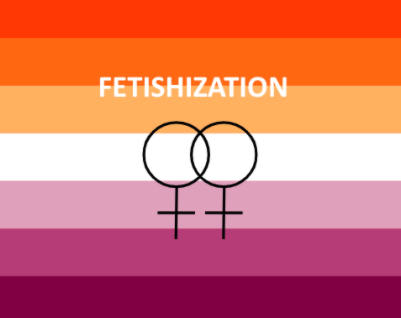“Say that you a lesbian, girl, me too” and “I can’t wait to get off work to go and see you. Please bring your girlfriend along with you” are lyrics from a new Drake song released in early September called “Girls Want Girls.” These lyrics coming from a heterosexual and cisgender male rapper, left many confused. While some overlooked them as a joke, others viewed the strange lyrics as an offensive display of fetishizing queer women. Although it’s true that misogyny and fetishization have always been prevalent in the music industry, Drake’s new song and the public’s reaction point to a greater cultural issue.
While there has been a significant increase in LGBTQ+ media representation in the past decade, there has also been harmful media representation that furthers stigmitization of queer women. Shows such as “Orange is the New Black” and “Glee” play into harmful stereotypes that generalize bisexual women as promiscuous. Additionally, older shows like “Friends” and “Gilmore Girls” that are still popular among today’s youth feature offensive jokes relating to queer women and the misrepresentation of lesbian relationships. These media’s past and present misrepresentations of the LGBTQ+ community make it all the more important that modern media avoids the use of these misconceptions and stereotypes.
Many musical artists have received backlash in recent years for the way in which their music impacts the LGBTQ+ community. Liam Payne released a song in 2019 called “Both Ways” about bisexuality, specifically among women. He states in the lyrics, “my girl she like it both ways, she like the way it all taste.” These lyrics, among others, received backlash for oversexualizing and fetishizing bisexual women. Similarly, Rita Ora dropped a single titled “Girls” in 2018. Once again, the song was criticized for depicting lesbian relationships in an unflattering way and for oversexualizing them. Billie Eilish recently faced some public disapproval after being accused of queerbaiting in her “Lost Cause” music video, furthering the conversation surrounding the fetishization and exploitation of lesbian and bisexual relationships.
This problem is not isolated to the music and film industries. Queer women face fetishization in their daily lives due to inaccurate preconceived notions. For example, the common misconceptions that a woman’s sexuality is centered around her past experiences with men, that bisexual women do not desire monogomous relationships and that those who reject heteronormativity are going through ‘a phase.’ These concepts are real and are observed in pop culture and real life, necessitating accountability for those who intensify the problem.
With the recent awareness surrounding these issues of fetishization on social media, it came to many as a shock that Drake would release such a strange song that so blatantly targeted and misrepresented lesbian women. In order to continue reducing these types of stigmatization and oversexualizalization in media and in real life, it is essential to call out artists who further these ideas. Even though this Drake song may not seem to be a significant issue, any media that promotes stigmatization, fetishization, or exploitation of LGBTQ+ women, no matter how big or small, poses a concern to the community because of its impact on real-life situations and the normalization of mistreatment.
This story was originally published on Inklings on September 22, 2021.




































